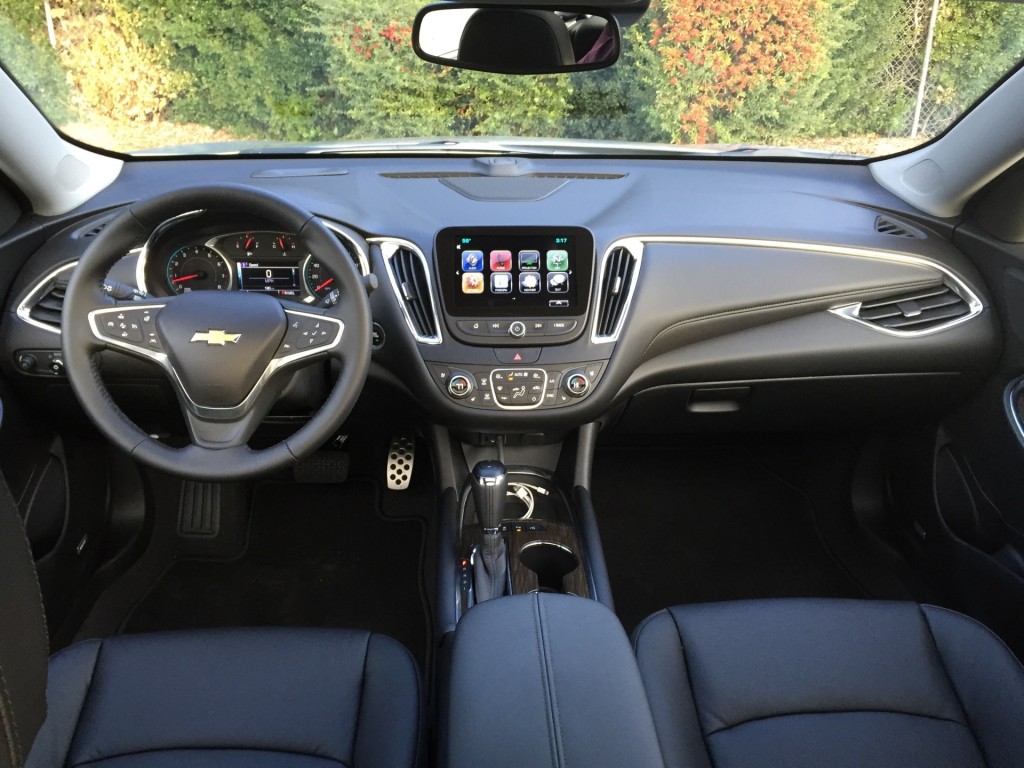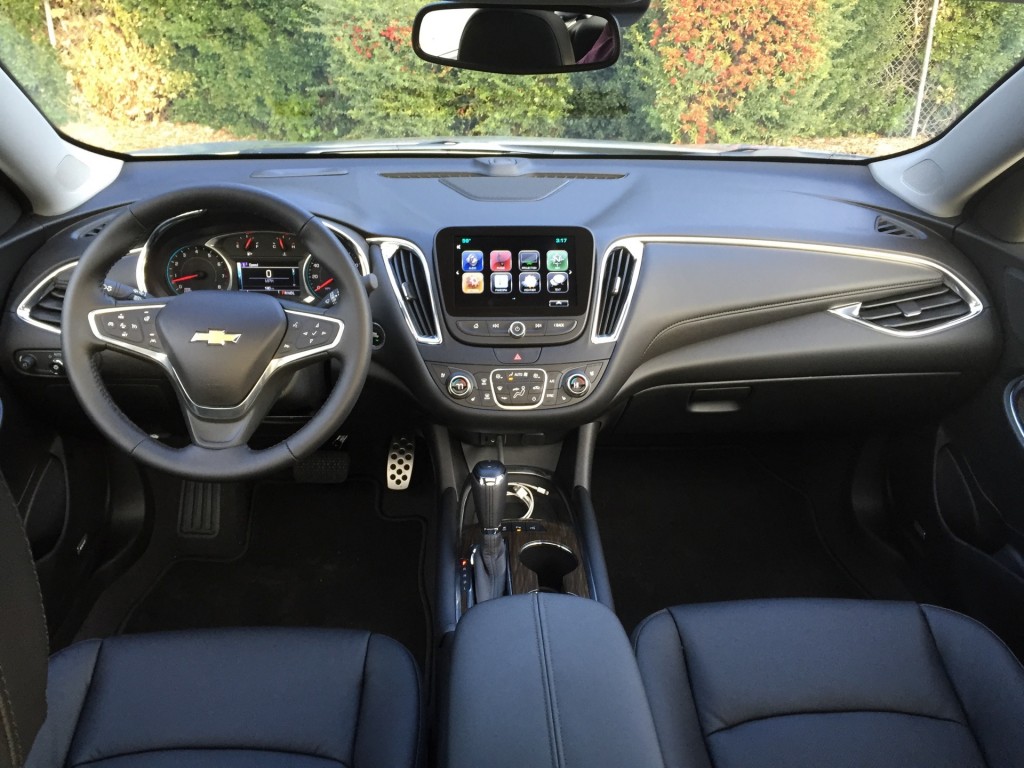The second generation of GM’s Voltec plug-in hybrid system is now powering a car that doesn’t actually have a plug at all.
The new 2016 Chevrolet Malibu Hybrid uses essentially the same powertrain as the 2016 Chevy Volt, but with a far smaller battery pack.
That makes it a new entrant in the hybrid mid-size sedan category, which includes the Ford Fusion, Hyundai Sonata, Kia Optima, and Toyota Camry.
DON’T MISS: 2016 Hyundai Sonata Hybrid And Plug-In Hybrid First Drive
And it turns out to make the hybrid Malibu an exceptionally fuel-efficient car.
We’ve now driven three different hybrid examples of the all-new Malibu, and several more of its gasoline-powered counterparts.
The 2016 Malibu replaces a widely panned model that lasted only three model years: 2013 through 2015.

2016 Chevrolet Malibu – First Drive – Palo Alto, CA
And it addresses that car’s shortcomings with a wheelbase almost 4 inches longer, giving a much larger passenger compartment and a rear seat capable of holding two adults in comfort for the first time since the 2012 Malibu.
The new Malibu really is all-new: It rides on a new architecture, is about 300 pounds lighter than its predecessor, has new styling that’s quite similar to the larger Chevy Impala, and offers three different new powertrains.
The gasoline versions can be ordered with turbocharged 1.5-liter or 2.0-liter fours from the latest GM Ecotec family. The smaller engine is paired with a six-speed automatic transmission, while the larger uses an eight-speed auto.
ALSO SEE: Is The 2016 Chevy Volt GM\’s Future Hybrid System In Disguise?
Then there’s the Malibu Hybrid, using the Voltec two-motor hybrid system attached to a 1.8-liter four-cylinder engine (the Volt’s is 1.5 liters) and a 1.5-kilowatt-hour air-cooled lithium-ion battery pack in the trunk.
Engine outputs are given as 124 horsepower and 129 pound-feet of torque. [UPDATE: As a number of readers pointed out, those outputs are for the engine only. The combined powertrain produces 182 hp and 277 lb-ft of torque.]
It’s expected to earn EPA ratings of 47 mpg combined (48 mpg city, 45 mpg highway) and will go on sale this spring.
Two of our three test drives were short—less than 20 miles—so we didn’t have a chance to get any meaningful gas-mileage data.

2016 Chevrolet Malibu Hybrid
Our third drive, last week, covered 250 miles over 36 hours, though almost all of that was at highway speeds in freezing weather (due to an unexpected snowstorm and a hilly driveway).
The car’s trip computer logged 41.4 mpg, or not quite 10 percent below the highway rating. That’s about what we’d expect in cold weather. A similar test of a 2012 Ford Fusion Hybrid—now rated at 42 mpg combined (44 mpg highway, 41 mpg city)—produced a recorded rating of 36.8 mpg.
Higher ratings are possible: When we got the car, its “Best” rating in the trip computer was 49.1 mpg, and our 25-mile running averages on switching off the car ranged from 35.0 up to 53.4 mpg.
We hope to retest the hybrid Malibu at a later date, over more varied duty cycles and in more temperate weather, to get a better feel for its around-town efficiency as well.
CHECK OUT: 2013 Ford Fusion Hybrid: Quick Winter Gas Mileage Test
But on our brief drives, we found the Malibu Hybrid an exceptionally pleasant car to spend time in.
The hybrid system is capable of electric-only running at speeds as high as 55 miles per hour, and the transition from electric to blended engine power is close to imperceptible.
GM has had some of the best noise suppression in the business for several years now, and the Malibu is quiet under most circumstances.

2016 Chevrolet Malibu Hybrid, Catskill Mountains, NY, Dec 2015
Maximum acceleration will produce noticeable noise from the engine, but it’s more of a remote motorboat thrumming sound than the desperate howl of older Prius hybrids.
Subjectively, the Malibu Hybrid felt slightly louder under full acceleration than the Volt. While it has a larger engine that would explain it, we’re happy to be corrected on that impression if GM has audio data to disprove it.
The hybrid Malibu will accelerate from 0 to 20 mph electrically, unless you’re heavy on the pedal. And we observed frequent electric-only running in the 20- to 40-mph band used around town.
MORE: How Similar Are Chevy Volt & Malibu Hybrid Powertrains? Very Much; Here\’s Why
The front seats are comfortable, and the Malibu uses superbly crisp 7- or 8-inch touchscreen displays that project above the top of the console. Their graphic appearance and use is almost identical to the one in the 2016 Volt (minus that car’s plug-in functions).
Too much knowledge can be a bad thing, though: We found ourselves periodically reaching for the Volt’s left-hand paddle to boost regeneration before stops—only to change audio channels each time.
The Malibu Hybrid does offer a Low setting on the drive selector that increases regen, but we missed the paddle. Variable regen-on-demand isn’t found on any other hybrid mid-size sedan, however, so it isn’t likely to make it to the Malibu either.

2016 Chevrolet Malibu Hybrid – propulsion system
For drivers interested in maximum electric running, the “pulse and glide” technique works exceptionally well in the hybrid Malibu.
It’s been awhile since we’ve driven other hybrid mid-size sedans, but our impression is that the Malibu has stronger and more frequent electric-only running. That’s a good thing.
We were also impressed with the Malibu’s lane-departure correction system, which seemed less abrupt than several others we’ve tested recently, with more nuanced corrections.
We found we could actually let it keep the car within relatively straight lanes for a few miles at a time without too much “ping-ponging,” or drifting from side to side.
This is a version of the system to which GM will add lane-centering in the 2017 Cadillac CT6 to provide “SuperCruise,” or hands-off autonomous highway driving. We look forward to testing that too.
It’s part of a Driver Confidence Package that bundles Front Automatic and Pedestrian Braking (at city speeds), intelligent headlights, Front and Rear Park Assist, Side Blind-Zone and Lane-Change Alerts, Lane Keep Assist, Forward Collision Alert, and Rear Cross-Traffic Alert.
Other notable features include Onstar with connectivity through 4G LTE service, and a built-in WiFi hotspot as standard.

2016 Chevrolet Malibu Hybrid
Overall, the new hybrid Malibu impressed us—especially at a starting price of $28,645.
Its real-world fuel economy is likely to live up to its EPA ratings, minus the effects of cold weather, and it’s a good-looking, comfortable, and competent car.
It’s more refined than the Camry Hybrid, has higher EPA ratings than the Fusion Hybrid, and much smoother operation than the single-motor hybrid systems used in the latest Hyundai Sonata and Kia Optima.
It’s the first of three different Malibu Hybrid models to use a full hybrid system; the two previous generations used versions of GM’s mild-hybrid belt-alternator-starter system.
This one benefits from all the work GM put into refining the second generation of its Volt system, and at last the Chevy Malibu Hybrid lives up to its hybrid name.
_______________________________________
Follow GreenCarReports on Facebook and Twitter.

